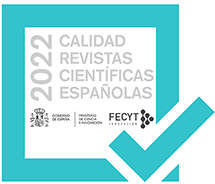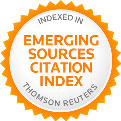Predicción del motivo salud en el ejercicio físico en centros de fitness. [Prediction of health reason in physical exercise in fitness centers].
Resumen
El objetivo de este estudio fue comprobar si el apoyo de la autonomía, las necesidades psicológicas básicas y la motivación intrínseca predicen el motivo de práctica hacia la mejora o mantenimiento de la salud. La muestra estuvo compuesta por 602 practicantes de actividades dirigidas con ritmo coreografiados (zumba, aeróbic, step, fight box, batuka, danza contemporánea, flamenco, sevillanas y bailes latinos), a los que se midió el apoyo de autonomía, las necesidades psicológicas básicas, la motivación intrínseca y el motivo salud. Tras el análisis de regresión lineal múltiple por pasos, la salud fue predicha positivamente por el soporte de autonomía del técnico, la satisfacción de los mediadores psicológicos y la motivación intrínseca. Se discuten los resultados en relación al diseño de programas de intervención en busca de estilos de vida más saludables.
Abstract
The aim of this study was to test if health being the reason of sport practice can be predicted by the support of autonomy, basic psychological needs and intrinsic motivation. A total of 602 practitioners participated in activities aimed at choreographed rhythm (zumba, aerobics, step, box fight, batuka, contemporary dance, flamenco, sevillanas and Latin dances) where the factors support of autonomy, basic psychological needs, intrinsic motivation and health as the reason, were measured. After the stepwise multiple linear regression analysis, the factor health was positively predicted by the technical support of autonomy, the satisfaction of psychological mediators and the intrinsic motivation. The results are discussed in relation to the design of intervention programs in search of healthier life styles.
http://dx.doi.org/10.5232/ricyde2015.04005
--------------------------------------------------------------------------
Referencias/references
Álvarez, M. S.; Balaguer, I.; Castillo, I., & Duda, J. L. (2009). Coach autonomy support and quality of sport engagement in young soccer players. The Spanish Journal of Psychology, 12(1), 138-148.
http://dx.doi.org/10.1017/S1138741600001554
Balaguer, I.; Castillo, I.; Álvarez, M., & Duda, J. L. (2005). Importance of social context in the prediction of self-determination and well-being in athletes of different level. En Symposium on “Motivation in Sport and Physical Activity”. 9th European Congress of Psychology. Granada: Universidad de Granada.
Balaguer, I.; Castillo, I., y Duda, J. L. (2008). Apoyo a la autonomía, satisfacción de las necesidades, motivación y bienestar en deportistas de competición: un análisis de la Teoría de la autodeterminación. Revista de Psicología del Deporte, 17(1), 123-139.
Belando, N.; Ferriz-Morell, R. y Moreno-Murcia, J. A. (2012). Propuesta de un modelo para la mejora personal y social a través de la promoción de la responsabilidad en la actividad físico-deportiva. RICYDE. Revista Internacional de Ciencias del Deporte, 8(29), 202-222.
http://dx.doi.org/10.5232/ricyde2012.02902
Castillo, I., y Balaguer, I. (2001). Dimensiones de los motivos de práctica deportiva de los adolescentes valencianos escolarizados. Apunts: Educación Física y Deportes, 63, 22-29.
Chatzisarantis, N.; Hagger, M. & Brickell, T. (2008). Using the construct of perceptive autonomy support to understand social influence within the theory of planned behavior. Psychology of Sport and Exercise, 9, 27-44.
http://dx.doi.org/10.1016/j.psychsport.2006.12.003
Deci, E. L., & Ryan, R. M. (1985). Intrinsic motivation and self-determination in human behavior. Nueva York: Plenum.
http://dx.doi.org/10.1007/978-1-4899-2271-7
Deci, E. L., y Ryan, R. M. (1991). Un enfoque motivacional para auto: La integración de la personalidad. En R. Dienstbier (Ed.), Nebraska simposio sobre la motivación: Vol. 38. Perspectivas sobre la motivación (pp. 237-288). Lincoln, NE: University of Nebraska Press.
Deci. E. L., & Ryan, R. M. (2000). The “what” and “why” of goal pursuits: Human needs and the self-determination of behavior. Psychological Inquiry, 11, 227-268.
http://dx.doi.org/10.1207/S15327965PLI1104_01
Edmunds, J. M.; Ntoumanis, N., & Duda, J. L. (2006). A Test of Self-Determination Theory in the Exercise Domain. Journal of Applied Social Psychology, 36(9), 2240-2265.
http://dx.doi.org/10.1111/j.0021-9029.2006.00102.x
García-Ferrando, M. (2006). Posmodernidad y deporte: Entre la individualización y la masificación. Encuesta sobre hábitos deportivos de los españoles 2005. Madrid: CSD y CIS.
González-Serrano, G.; Huéscar, E., y Moreno-Murcia, J. A. (2013). Satisfacción con la vida y ejercicio físico. Motricidad. European Journal of Human Movement, 30, 131-151.
Hagger, M. S.; Chatzisarantis, N. D.; Hein, V.; Pihu, M.; Soós, I., & Karsai, I. (2007). The perceived autonomy support scale for exercise settings (PASSES): development, validity, and cross-cultural invariance in young people. Psychology of Sport and Exercise, 8(5), 632-653.
http://dx.doi.org/10.1016/j.psychsport.2006.09.001
Lonsdale, C.; Hodge, K., & Rose, E. A. (2008). The development of the Behavioral Regulation in Sport Questionnaire (BRSQ): Instrument development and initial validity evidence. Journal of Sport and Exercise Psychology, 30, 323-355.
Marcos, P. J.; Borges, F.; Rodríguez, A.; Huéscar, E., y Moreno-Murcia, J. A. (2011). Indicios de cambio en los motivos de práctica físico-deportiva según el sexo y la edad. Apuntes de Psicología, 29, 123-132.
Moreno, J. A.; Borges, F.; Marcos, P. J.; Sierra, A. C., y Huéscar, E. (2012). Motivación, frecuencia y tipo de actividad en practicantes de ejercicio físico. Revista Internacional de Medicina y Ciencias de la Actividad Física y el Deporte, 12(48), 649-662.
Moreno-Murcia, J. A.; Cervelló, E.; Borges, F., y Conte, L. (2009). El interés en la opinión del practicante de ejercicio físico tan importante papel en la predicción de la aptitud / de salud razón. Fitness and Performance Journal, 8(4), 247-253.
http://dx.doi.org/10.3900/fpj.8.4.247.s
Moreno, J. A.; Cervelló, E.; Marcos, P., y Martín, E. (2010). Importancia de la valoración del comportamiento autónomo del practicante para el disfrute en programas de ejercicio físico acuático. Cuadernos de Psicología del Deporte, 10(1), 57-70.
Moreno, J. A.; Cervelló, E., y Martínez Camacho, A. (2007). Validación de la Escala de Medida de los Motivos para la Actividad Física-Revisada en españoles: Diferencias por motivos de participación. Anales de Psicología, 23, 167-176.
Moreno-Murcia, J. A.; Cervelló-Gimeno, E.; Martínez-Galindo, M. C., y Moreno R. (2013). Validación de la Escala de Creencias Implícitas de habilidad (CNAAQ-2) al contexto español. Diferencias según la práctica físico-deportiva. RICYDE. Revista Internacional de Ciencias del Deporte, 9(32), 100-113.
http://dx.doi.org/10.5232/ricyde2013.03201
Moreno, J. A.; Conte, L.; Borges, F., y González-Cutre, D. (2008). Necesidades psicológicas básicas, motivación intrínseca y propensión a la experiencia autotélica en el ejercicio físico. Revista Mexicana de Psicología, 25(2), 305-312.
Moreno-Murcia, J. A.; Conde, C., y Sáenz-López, P. (2012). Importancia del apoyo de autonomía en la figura del docente de educación física. Tándem. Didáctica de la Educación Física, 40, 18-27.
Moreno, J. A.; González-Cutre, D.; Martín-Albo, J., & Cervelló, E. (2010). Motivation and performance in physical education: an experimental test. Journal of Sports Science and Medicine, 9, 79-85.
Moreno-Murcia, J. A.; Marcos, P., y Huéscar, E. (en prensa). Motivos de práctica físico-deportiva en mujeres: Diferencias entre practicantes y no practicantes. Cultura y Educación.
Moreno, J. A.; Parra, N., y González-Cutre, D. (2008). Influencia del apoyo a la autonomía, las metas sociales y la relación con los demás sobre la desmotivación en educación física. Psicothema, 20(4), 636-641.
Navarro, N.; González-Cutre, D.; Marcos, P. J.; Borges, F.; Hernández, A., Vera, J. A., y Moreno, J. A. (2008). Perfiles motivacionales en la actividad física saludable: un estudio desde la perspectiva de la teoría de la autodeterminación. En Actas del XI Congreso Nacional, XI Andaluz y III Iberoamericano de Psicología de la Actividad Física y del Deporte. Sevilla: Universidad Pablo de Olavide.
Ryan, R. M., & Deci, E. L. (2000). Self-determination theory and the facilitation of intrinsic motivation, social development, and wellbeing. American Psychologist, 55, 68-78.
http://dx.doi.org/10.1037/0003-066X.55.1.68
Sánchez, J. M., y Núñez, J. L. (2007). Análisis preliminar de las propiedades psicométricas de la versión española de la Escala de Necesidades Psicológicas Básicas en el Ejercicio Físico. Revista Iberoamericana de Psicología del Ejercicio y el Deporte, 2(2), 83-92.
Sarrazin, P.; Vallerand, R.; Guillet, E.; Pelletier, L., & Cury, F. (2002). Motivation and dropout in female handballers: A 21-month prospective study. European Journal of Social Psychology, 32, 395-418.
http://dx.doi.org/10.1037/0003-066X.55.1.68
Sebire, S. J.; Standage, M., & Vansteenkiste, M. (2008). Development and validation of the goal content for exercise questionarire. Journal of Sport and Exercise Psychology, 30, 353-377.
Standage, M.; Duda, J. L., & Ntoumanis, N. (2006). Students’ motivational processes and their relationship to teacher ratings in school physical education: A self-determination theory approach. Trimestral de Investigación para el Ejercicio y el Deporte, 77, 100-110.
Torregrosa, D.; Belando, N., y Moreno-Murcia, J. A. (2014). Predicción de la satisfacción con la vida en practicantes de ejercicio físico saludable. Cuadernos de Psicología del Deporte, 14, 117-122.
http://dx.doi.org/10.4321/S1578-84232014000100014
Vallerand, R. J. (1997). Toward a hierarchical model of intrinsic and extrinsic motivation. En M. P. Zanna (Ed.), Advances in experimental social psychology (pp. 271-360). Academic Press: New York.
Vallerand, R. J. (2001). A hierarchical model of intrinsic and extrinsic motivation in sport andexercise. En G. C. Roberts (Ed.), Advances in motivation in sport and exercise (pp. 263-319). Champaign, IL: Human Kinetics.
Vallerand, R. J. (2007). Intrinsic and extrinsic motivation in sport and physicalactivity. A review and a look at the future. En G. Tenenbaum y R. C. Eklund (Eds.), Handbook of sportpsychology (3ª ed., pp. 59-83). Nueva York: John Wiley.
Vallerand, R. J., y Losier, G. F. (1999). Un análisis integral de la motivación intrínseca y extrínseca en el deporte. Diario de Psicología del Deporte, 11, 142-169.
Vallerand, R. J., & Rousseau, F. L. (2001). Intrinsic and extrinsic motivation in sport and exercise: A review using the hierarchical model of intrinsic and extrinsic motivation. En R. N. Singer, H. A. Hausenblas y C. M. Janelle (Eds.), Handbook of Sport Psychology (2ª ed., pp. 389-416). New York: John Wiley and Sons.
Wilson, P. M., y Rodgers, W. M. (2004). The relationship between perceived autonomy support, exercise regulations and behavioral intentions in women.Psychology Of Sport And Exercise, 5(3), 229-242.
http://dx.doi.org/10.1016/S1469-0292(03)00003-7
Wilson, P. M.; Rogers, W. T.; Rodgers, M., & Wild, T. C. (2006). The psychological Need Satisfaction in exercise scale. Journal of Sport and Exercise Psychology, 28, 231-25.
Palabras clave/key words
Texto completo/Full Text:
PDF------------------------ 0 -------------------------
RICYDE. Revista Internacional de Ciencias del Deporte
![]()

Publisher: Ramón Cantó Alcaraz
ISSN:1885-3137 - Periodicidad Trimestral / Quarterly

